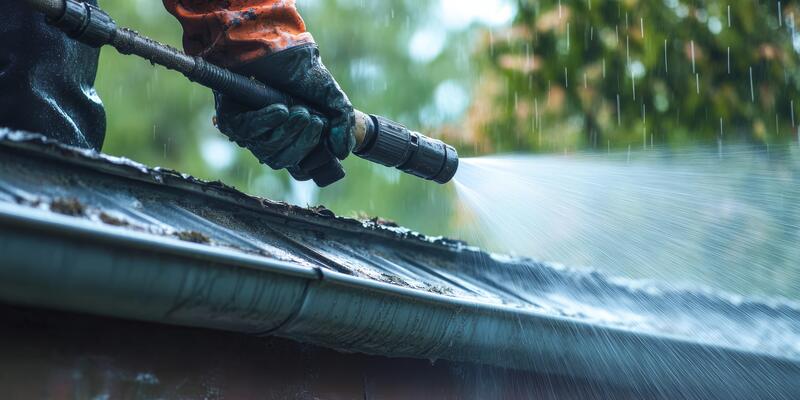How to Choose the Best Roof for Your Home in Centerville County, VA
Choosing the right roof for your home is one of the most important decisions you’ll make as a homeowner. Not only does your roof protect your home from the elements, but it also adds to your home’s overall aesthetic and can influence its energy efficiency. In Centerville County, VA, where weather conditions range from humid summers to snowy winters, selecting the best roofing material is crucial for both durability and long-term value.
At Gutter Ethics, we understand that every homeowner’s needs are different. Whether you’re replacing an old roof or building a new home, we’re here to help guide you through the process of selecting the perfect roof. Here’s what you need to consider when choosing the best roof for your home in Centerville County.
1. Consider Your Climate
Centerville County experiences a variety of weather conditions throughout the year, including hot summers with high humidity and cold winters with snow and ice. When selecting a roofing material, it’s essential to consider how the material will perform in these conditions:
- Durability in Rain and Snow: You’ll need a roof that can handle heavy rain, snow, and potential ice dams during winter. Materials like metal roofing and asphalt shingles are great for shedding snow and rain quickly, reducing the risk of leaks.
- Heat Resistance: In the hot summer months, your roof will be exposed to intense heat and UV rays. A reflective roof or lighter-colored materials, such as metal roofing or cool asphalt shingles, can help keep your home cooler and lower your energy bills by reflecting heat rather than absorbing it.
2. Assess the Architectural Style of Your Home
The aesthetic appeal of your roof is an essential part of choosing the right material. You want the roof to complement the overall style and design of your home. Here are some popular options based on different architectural styles:
- Asphalt Shingles: A popular choice for most homes in Centerville County, asphalt shingles are versatile, affordable, and come in a variety of colors and styles. They fit well with traditional, ranch, or contemporary home designs.
- Metal Roofing: Metal roofs are ideal for modern, farmhouse, or industrial-style homes. Available in various styles, including standing seam and metal shingles, metal roofing can add a sleek, contemporary touch.
- Wood Shingles or Shake: If you have a more rustic or traditional-style home, wood shingles or shake can provide a charming, natural look. However, they require more maintenance and may not be as durable in certain climates.
- Tile or Slate Roofing: For Mediterranean, Spanish, or historic-style homes, tile or slate roofing offers timeless beauty and durability. These materials are heavier and more expensive but can last for decades.
3. Understand the Cost of Roofing Materials
Roofing material costs can vary significantly depending on the material you choose. When deciding on the best roof for your home, consider both the initial cost and the long-term value. Here are some common roofing options and their price ranges:
- Asphalt Shingles: The most budget-friendly option, asphalt shingles cost around $100 to $150 per square (100 square feet). They are the most common roofing material in Centerville County due to their affordability and ease of installation.
- Metal Roofing: Metal roofs tend to be more expensive, ranging from $300 to $900 per square. While the upfront cost is higher, they can last up to 50 years or more and often require less maintenance.
- Wood Shingles or Shake: These materials typically range from $500 to $1,000 per square. While they offer a unique aesthetic, they also require regular maintenance and may not be as durable in extreme weather conditions.
- Tile or Slate Roofing: Tile and slate roofing are premium materials, with prices ranging from $700 to $2,000 per square. These options offer unmatched durability and longevity, but the high cost makes them less suitable for some homeowners.
4. Consider Longevity and Maintenance
When choosing a roof, think about how long you want your roof to last and the level of maintenance required. Some materials require more upkeep than others, while others can last for decades with little maintenance. Here’s an overview:
- Asphalt Shingles: Asphalt shingles generally last 20 to 30 years, with proper maintenance. They require occasional inspections for damage and debris removal to ensure optimal performance.
- Metal Roofing: Metal roofs are incredibly durable and can last anywhere from 40 to 70 years with minimal maintenance. They’re resistant to fire, insects, and rot, making them an excellent long-term investment.
- Wood Shingles or Shake: Wood roofs typically last 30 to 50 years, but they require frequent maintenance, including sealing and cleaning to prevent rot and algae growth.
- Tile or Slate Roofing: Tile and slate roofs can last 50 years or more with minimal maintenance. They’re resistant to harsh weather conditions, but they can be expensive to repair if damaged.
5. Evaluate Energy Efficiency
An energy-efficient roof can make a significant difference in your home’s comfort and utility bills. Here are some roofing options that contribute to energy efficiency:
- Cool Roofs: Cool roofs are designed to reflect more sunlight and absorb less heat. They can be made from reflective asphalt shingles, metal roofing, or modified bitumen. Cool roofs are ideal for reducing your air conditioning costs in the summer.
- Insulated Roofing: Insulated roofing systems, often available in metal or synthetic options, can help maintain a more consistent indoor temperature by reducing heat transfer. These systems can improve energy efficiency, particularly in homes with attics or unventilated roof spaces.
6. Consider Roof Warranty and Installation
A warranty is an important consideration when selecting your roof. Many roofing materials come with a manufacturer’s warranty, which can last anywhere from 20 years to a lifetime, depending on the material. Additionally, ensure that your roofing contractor offers a strong workmanship warranty. A well-installed roof is essential for long-lasting performance, so it’s crucial to work with a reputable contractor with experience installing your chosen material.
7. Choose a Reliable Roofing Contractor
Choosing the right roofing contractor is just as important as choosing the right roofing material. A professional contractor will help you select the best material for your home, ensure proper installation, and provide the necessary maintenance to extend your roof’s life. Look for a contractor with:
- Experience in the industry: Choose a contractor with years of experience and a solid reputation in Centerville County.
- Proper licensing and insurance: Ensure your contractor is licensed and insured to protect you in case of accidents or damage during installation.
- Positive reviews: Research local reviews and ask for recommendations from friends and neighbors to find a trusted contractor.
- Free estimates: A good roofing contractor will offer free estimates and be transparent about the costs of materials and labor.
Conclusion: Make an Informed Decision for Your Roof
Choosing the best roof for your home in Centerville County requires careful consideration of your budget, home style, climate, and long-term goals. Whether you opt for affordable asphalt shingles, durable metal roofing, or a premium tile roof, your decision will affect your home’s protection and appearance for years to come.
At Gutter Ethics, we are committed to helping homeowners make informed decisions and providing expert roofing services. Our team is ready to assist you in selecting the best roof for your home and ensure that your installation is seamless and professional.
If you’re ready to take the stress out of gutter maintenance, contact us today. Let us show you why we’re the best in the business!

